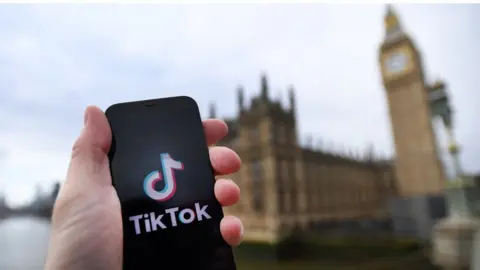TikTok banned from UK Parliament over security concerns
 EPA-EFE/REX/Shutterstock
EPA-EFE/REX/ShutterstockThe UK Parliament has banned Chinese-owned social media app TikTok from its network over security concerns.
A spokesman said the app, used by a number of British MPs, would also be blocked from devices issued to staff.
It follows a decision by the UK government to ban ministers from using the app on their work phones following a security review, he added.
TikTok has strongly denied allegations that it hands users' data to the Chinese government.
In a statement, it called Parliament's move "misguided," and said it was "based on fundamental misconceptions about our company".
It is understood the ban means MPs and guests to Parliament will not be able to access TikTok on devices connected to official Wi-Fi accounts.
Instead, if they want to use the app on their phones they will have to connect to their own mobile data provider.
The Scottish government also announced on Thursday it will join the Welsh government in banning the app from official devices.
Scottish Deputy First Minister John Swinney said the ban, which would begin immediately, would not extend to personal devices used by staff.
MSPs and staff working at the Scottish Parliament have also been "strongly advised" to remove TikTok from their phones.
'Self-defeating step'
TikTok, which has exploded in popularity in recent years, gathers a lot of information on users - including their age, location, device and even their typing rhythms. Its cookies also track user activity elsewhere on the internet.
US-based social media sites also do this, but TikTok's Chinese parent company, ByteDance, has faced claims of being influenced by Beijing.
After the UK Parliament announced its ban, a spokesman for the app said "despite our requests, we have not been offered any opportunity to address concerns".
"Potentially depriving users from access to and engagement with their representatives is a self-defeating step, especially in our shared fight against misinformation," he added.
"We have begun implementing a comprehensive plan to further protect our European user data, which includes storing UK user data in our European data centres and tightening data access controls, including third-party independent oversight of our approach."
